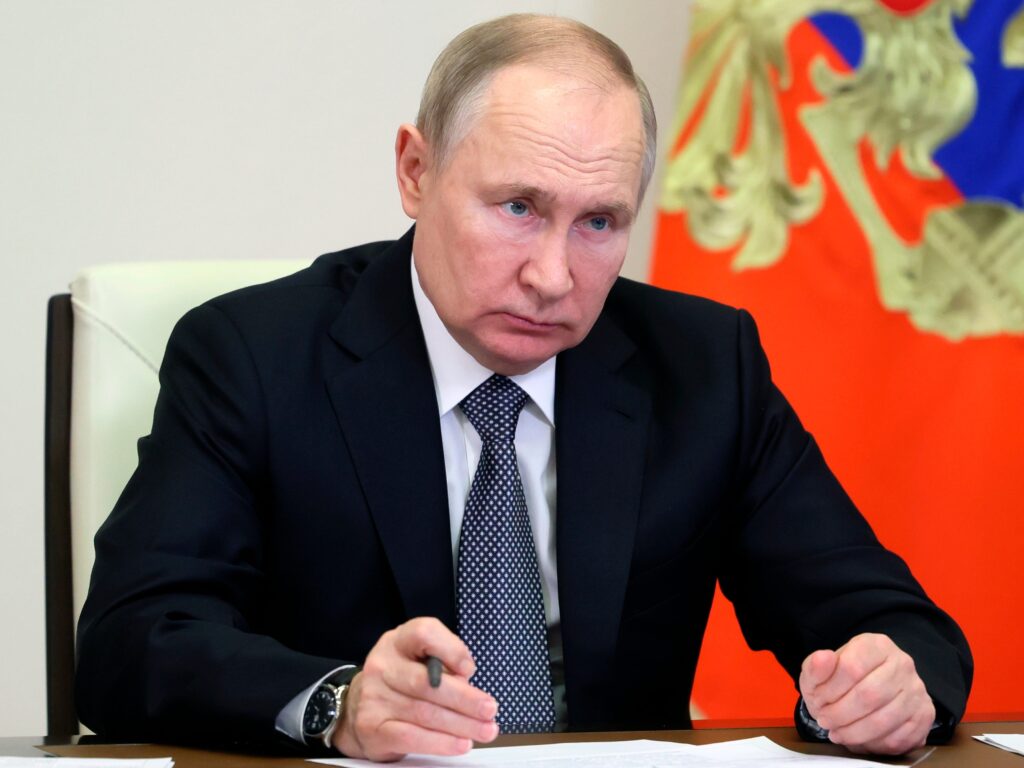- Stephen Norris is a professor of Russian history at Miami University in Oxford, Ohio.
- Norris studies Russian history, nationalism, media, and propaganda.
- Norris told Insider Putin's speeches have gotten more existential and apocalyptic.
The following is a Q&A with Stephen Norris, a professor of Russian history at Miami University in Oxford, Ohio. It has been lightly edited for length and clarity.
What is your perception of how Putin's speeches have changed over time, and what specifically about them is most concerning to you?
The evolution is probably most apparent in the last year or so. The major Putin state speech of the year is the Victory Day speech every year on May 9. Those speeches tend to be quite repetitive. Every year he says something about the sacrifice that the Soviet Union made, but he also transitions that into saying, "We have inherited that sacrifice. It's a sacred victory where we, Russia/the Soviet Union, saved the world from the brown plague of fascism and liberated Europe." And then he usually, especially over the last 10 years, says something about how "We have inherited this willingness to defend our motherland."
This year's Victory Day speech was one where he blended these two ideas together. Now it's, "We've done that, but now we're also actively doing it again." And that's why this year's Victory Day speech was quite scary.
It's almost like this DNA of patriotism that sort of seeded the ground for his speeches over the last year, especially since the invasion of Ukraine. He laid out this culture of patriotism and this historic mission that Russia has inherited from victory over Nazi Germany, and now he's activated in that the necessity of having to fight Ukraine because what he keeps saying is that "We're not really fighting an offensive war. We're fighting a defensive war where we now have to once again liberate Europe from the brown plague of fascism."
What similarities do you see between the messaging put forth by Putin and Russia today compared to Soviet Union propaganda?
The messaging about Victory Day and it's significance is largely a Putin-era phenomenon — laying claim to this victory over Nazi Germany is the one achievement from the 20th century that the Putin state has really latched onto, and then used to kind of construct this larger patriotic culture around the willingness of Russians across centuries to sacrifice themselves for the motherland.
Having a simple repetitive message is key to any propaganda, and one that rests at least in some part on truth. So it is of course true that the Soviet Union won WWII and that the sacrifices of the Soviet Union in World War II are difficult for us in America to understand. But then the other side of propaganda that Putin also is quite adept at is ignoring all the inconvenient facts. In that sense, the Victory Day propaganda is a Soviet era creation that's been revived under Putin.
In the 19th century and even in the 20th century, in the imperial propaganda and then Soviet propaganda, Russia "never attacked" anyone, or the Soviet Union never attacked anyone — it was always defense. Even when it wasn't. Clearly Russia has attacked Ukraine, but Putin is pitching it as a necessary defense of our civilization and Russians living across our borders. In the 20th century, it was more the sense of they need to protect socialist regimes from the evils of the West.

Did Putin use the Victory Day speeches to repeat that messaging so the Russian people would be primed to accept his narrative of the Ukraine invasion?
I don't think that Putin had in mind 10 years ago that he was going to invade Ukraine. What happened in the wake of Putin returning to the presidency and these massive protests that broke out in 2011 and 2012 across Russia, especially in Moscow, was a fear from Putin's point of view of a color revolution, or some sort of popular revolt that would topple his system. And so what the Putin system did, especially through the Ministry of Culture, was to particularly stress patriotic narratives — in schooling, movies, television shows, news programs, and things like that.
You compared the speech Putin gave announcing the annexation of four Ukrainian territories to the Nazi propaganda minister, Joseph Goebbels. Can you elaborate on that?
One of the more worrisome trends in Putin speeches, especially in the last six or seven months, has been how amorphous, almost existential they've been. The Ukrainian war has been framed in existential terms — it's a war to save Russian civilization. In the speech when he signed the treaties that annexed the four territories, he said Western culture is nothing less than satanism and this is the new threat against Russia. It was kind of scary and quite apocalyptic in the way his speeches had ever been. And in that speech, Putin actually referenced Goebbels. He said what the West has done is create a culture of lies about Russia that's reminiscent of Goebbels.
In a speech in May of 1943, Goebbels said weirdly similar things. This was after Nazi Germany had lost at Stalingrad after the Soviet Union was turning the tide of the war. Goebbels gave a speech that turned the seeming defeat into victory and into a more existential question, saying the allies are trying to eliminate German culture, German history, the German people.
As a historian, I don't want to go too far with comparisons, because of course Goebbels' speech was also filled with a lot about who was supporting the West and the need to answer "the Jewish question." That's not a big part of Putin speeches, but I think the analogy here is what does an authoritarian or authoritarian system or even a dictatorship do when things aren't going well in a war? And how do they cast the meanings of this war at that moment? And what Goebbels did in 1943 at that moment was to really bring these sort of apocalyptic, existential questions to the forefront. And that's in a sense what Putin's saying.
Why that's worrisome is because there's no obvious out. Where's the out when you cast the war in terms of your very way of life being at stake?

How much are film and TV in Russia part of the state's propaganda?
Like most European countries, Russia has a Ministry of Culture that oversees film production. In the wake of the protests in 2011 and 2012, Putin appointed a new cultural minister named Vladimir Medinsky, and every year he put out a list of the 10 things the state wanted in films: things like patriotic stories from the past and achievements in Soviet and Russian science. That meant that monies were dolled out only if you met one of those criteria.
Which meant that popular films, which are very slick, well-produced — they look like Hollywood films — increasingly took on patriotic messages that dovetail with the state's ideals. Tons and tons of war movies about WWII. It's really hard to overstate how many war movies have come out in Russia in the last 10 years. I think almost to the tune of, on average, about one per month.
Some of them are really good, some are a little more nuanced, but you can imagine if this is your basic consumption, you are on some level always getting messages about the significance of WWII, the patriotism of our forefathers in it, that we saved the world from fascism — those are the messages that the war speeches have kind of hijacked.
There's also examples over the last 10 years where if there are Ukrainians in the film, they usually fall in one of two guises. A Ukrainian who's in the Red Army, along with his fellow Soviet soldiers, who speaks Russian, is always good. But if the Ukrainian speaks Ukrainian in a Russian film, almost inevitably, he's a Nazi collaborator.
The media landscape in Russia is much more varied, even if it's still primarily state-run. It's not like the Soviet era where there's two channels, two radio stations, a handful of papers all controlled by the state. Now it's seemingly more diverse, so it doesn't necessarily feel to the public like it's centralized or condensed. In some ways, it's more sophisticated even than Soviet propaganda because of that.
A lot of American movies portray Russian characters as evil. How do those play into Russia's narratives about the West?
That's a frequent talking point in Russia, that Russians tend to be the villains now. And that really rankles with Russians, understandably so. American movies are widely released in Russia and they're frequently the most popular movies in Russia, just like they are in America. New American movies were still coming out in Russia all the way up until February this year, and every time an American movie came out with a Russian bad guy, there would be lots of articles in the Russian press.
Putin talks about Russophobia as a form of racism. And then someone can say, "Well, all these Hollywood movies do have all these bad Russians, therefore they really don't like us. So when the president says the West wants us to collapse and cease to exist as a nation, maybe that's true. Maybe not. I don't know." And that's the point.

